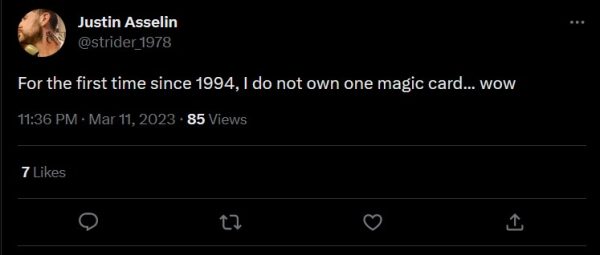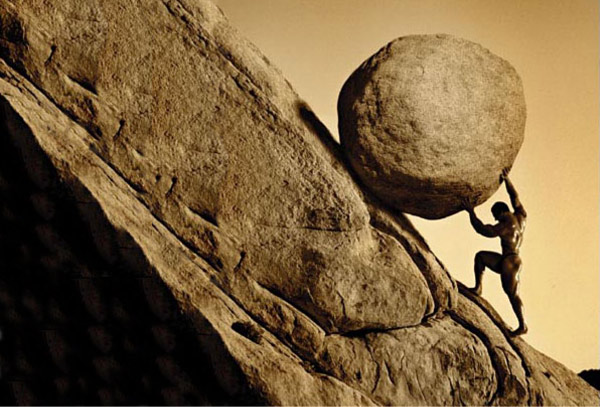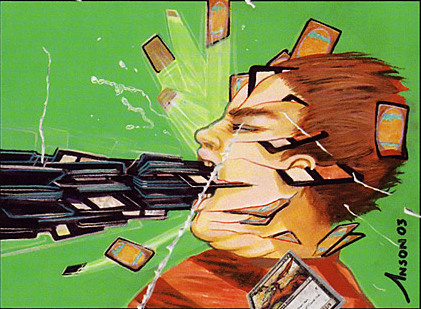Are you a Quiet Speculation member?
If not, now is a perfect time to join up! Our powerful tools, breaking-news analysis, and exclusive Discord channel will make sure you stay up to date and ahead of the curve.
I have been an active participant in the Magic Twitter community for many years now. In fact, Twitter likes to remind me of this once a year when I hit my anniversary date, whenever that is. Over the years, the site has become a powerful tool to help me reach tons of players all at once, building up a network of friendly players across the globe.
One such bond I forged a long time ago is with fellow Magic player Justin (@strider_1978)… or should I say, ex-Magic player? Check out this momentous tweet I stumbled upon over the weekend:

Justin is a long-time player, enjoying the game for nearly 30 years! Life circumstances and varying priorities contributed to his decision to sell out.
My first reaction to this tweet surprised me. I was jealous.
The Chase Is Over
This is a direct quote from Justin’s follow-up tweet. “Yes sir. I am done. The chase is over.”
Wow. This is such a profound tweet, and it’s one that really resonates. The way Magic is designed, there is always another card you’re looking for, another piece for the deck, another treasure to complete a collection, and another nostalgic piece of cardboard to remind us of our childhood. The pursuit is never-ending, part of the game since day one when Richard Garfield put the “collectible” in this collectible card game.
For example, Justin’s white whale in Magic was a Juzam Djinn. For years he was in active pursuit of an affordable copy—unfortunately, as the value of his cards climbed, so did the price of that pesky Juzam!
When Justin made the decision to sell his collection, he abandoned the lifelong, insatiable pursuit.

Just like that, the tie is severed. “It was a huge weight off my shoulders,” followed Justin when I messaged him directly about his decision. He went on to admit, “Don’t get me wrong. It was kind of tough.” The decision to sell everything wasn’t taken lightly, but overall, he’s happy with the decision.
I look at this sense of relief and I can’t help but picture what it would feel like for me. I don’t think I’d ever quit Magic altogether, but the prospect of selling everything but for a single deck and/or binder of cards is attractive for a number of reasons. Let me count the ways…
Top Five Reasons to Sell Out of Magic
#5 Freeing up Space (physical and mental)
By itself, a single Magic card takes up virtually no volume of space. Add stacks of cards, deck boxes, binders, dice, tokens, playmats, and an array of other accessories related to the game, and suddenly you have a ton of “stuff” filling up your closet. Selling out of Magic means you can rid yourself of all these items, leaving you with a tidier home and more shelf space in the process.
Beyond the physical, it’s also a relief to free up mental space. For example, if you’re spending time thinking about decks to build and adjust, cards you may want to pick up, cards you are actively trying to sell, etc., you are spending valuable mental energy on this game. In addition, I always monitor shipments of cards (to and from me) to ensure they aren’t lost by USPS—when you’re finished with Magic, these are minor worries and thoughts that no longer demand mental energy.
#4 Time
Magic is an extremely time-consuming game! Whether your favorite way of engaging is playing on Arena, playing against friends at the kitchen table, organizing and sorting through your collection, or buying and selling cards—hours can be sunk into this game before you even realize it.
Of course, if we’re having fun engaging in these Magic-related activities, then it’s all worth it. However, there is something to be said about the opportunity cost associated with all this time we’re spending. For example, as I write this article my two kids are playing nicely in the other room. I’m thrilled they’re getting along for once, but this is an opportunity to bond that I’m eschewing in favor of writing this article.
I sometimes wonder how much time I’d have back in my life if I were to leave Magic altogether. Sure, I love what I do in this game, but am I missing out on other life experiences without even realizing it? Are you?
#3 Money
Some say “time is money,” but in this case I am strictly referring to the financial value and opportunity cost associated with this card game. Take a step back for a moment and consider the approximate value of your collection. Next, think about what else that kind of money could help you buy. Whether your collection’s value is $100 and could pay for your next week’s grocery bill, or it’s $100,000 and you could pay off your mortgage with the money, there is always an opportunity cost associated with owning a Magic collection.
My primary motivation for engaging in Magic finance remains steadfast: saving money for my kids’ college educations. I’ve been completely transparent about this in the past—when there came a time when I could sell out of my cards to meet my college fund goals, I would do it. I’m nearly there today, and I’ve already begun selling much of the value from my collection as a result.
If you are juggling multiple priorities in life, make sure you are actively deciding to invest so much money in this card game, rather than passively doing it (by ignoring card values as they fluctuate over time). You may be surprised at the alternatives you could be using that money towards when you stop and consider it more seriously. Also, there’s the side benefit of not having so much money in cardboard sitting in your basement. I no longer dread the idea of having a basement flood or other catastrophic event wiping out a chunk of my net worth.
#2 Ending the Grind
I participate in a group that focuses on mindfulness at work. One of the concepts I appreciate most is the idea of “non-striving.” Too often I hear my inner voice declaring, “I’ll be happy when…” In other words, there’s always a next step, or a goal, that I am working towards in order to feel more fulfilled.
Do you know what I realized when it comes to Magic? I’m never fulfilled. No matter which cards I buy, what deck I build, or what collection I complete, there is always a new objective to work towards. On the one hand, that may give me a feeling of purpose and drive. On the other hand, the constant pursuit feels Sisyphean in a way.

Sisyphus is a character from Greek mythology whose punishment for cheating the gods was to have to push a round boulder up a hill for eternity. As he nears the top, the boulder rolls all the way back down the hill, forcing Sisyphus to start over again. That’s very much like my experience collecting Magic cards. Every time I finish some minor quest, I barely celebrate before I shift focus to the next card I “need” for my collection. I always tell myself “I’ll be happy when I finish this next goal” only to find a new card I would love to buy.
The grind is perpetual, time-consuming, and leaves me with a hollow feeling. Abandoning the lifelong pursuit is akin to letting the boulder fall back down the hill, and then walking away. It’s no wonder my friend Justin used the term “relief” when he described his feeling about selling out of Magic.
#1 Shifting Life Priorities
In addition to ending the grind, Justin cited another significant factor that led to his decision to sell out of Magic.
“There is an emotional attachment to cards from a younger time in a person’s life. Memories. Good times. Good people. A totally different kind of life, or world, back then as opposed to now. Even the community is a lot different. We were once outcasts. The nerds. The losers. Now it’s very mainstream…”
Justin reminisces about a different time—the mid-1990s to be more precise. I can relate to this sentiment. I remember what Magic was like when I started playing in 1997. The game wasn’t well known to most kids in school. To play Magic was to be a nerd, and this was something you kept within your small circle of friends. You didn’t advertise that you played this game.
Justin looks back on that time period with nostalgic fondness, and I can understand why. The game looks very different now than it did back in 1997. It’s not that it’s significantly better or worse. It’s just different.
In addition to the game’s evolution, we as people have also grown and changed over the years. You could say this aging process can cause us to “grow out of Magic.” Life changes, our circle of friends changes, and as a result, our priorities change. Instead of leaning on Magic as a way to connect with friends in a society where we are social outcasts, we are now adults raising kids, working full-time jobs, and navigating through life. Magic is still a fun game, but it isn’t the anchor it once was while we were floating adrift in life.
It's perfectly reasonable to acknowledge this evolution and respond in the way Justin did.
Wrapping It Up
There’s nothing wrong with having Magic be a lifelong pursuit. I pass zero judgment on anyone who is wholly committed to this game. I know of many Old School players in particular who declare that they will never sell their cards, and that they’ll enjoy playing Magic their entire life.
My intent this week is merely to shed light on the other side of the coin. The decision to quit Magic is not one to be taken lightly, especially when there are significant financial implications. There can be a number of reasons it makes perfect sense to sell out of the game, whether it be motivated by time, money, or simply an acknowledgment that Magic is a perpetual grind with no end.
As for my friend Justin, I suspect he’s not going to own zero Magic cards forever. He already confided, “I am gonna pick up some cheap revised for a white and black deck, so I can still play when I do meet some of y’all!” He’s already finding a new way to stay involved in the game—I did something similar after I sold my Old School decks. I immediately built a budget friendly Erhnam and Burn ‘em deck, rocking white-bordered Revised and Chronicles through and through.
Perhaps that is the best reason of all to quit Magic. It allows us to reconsider what we truly want out of the game. After all the finance, competitiveness, and completionism are stripped from the game, what remains is what we truly seek from it. For Justin, it’s simply a reason to meet friends and enjoy a casual game. It took him a major decision to sell out in order to get back in touch with what made the game special to him.
Would you have the same courage? What would you do with Magic if you were to sell all your cards and start at zero again? Perhaps the answer to this question is what would truly make you happy when it comes to engagement with Magic: the Gathering.





Seems a little too extreme to quit like that. If he wanted the Juzam Djinn that badly he had plenty of time to get one when it was dirt cheap. I paid $25 for Lightning Bolt and $50 for Hypnotic Specter. Both of them Alpha. Not so bad for a lifelong pursuit.